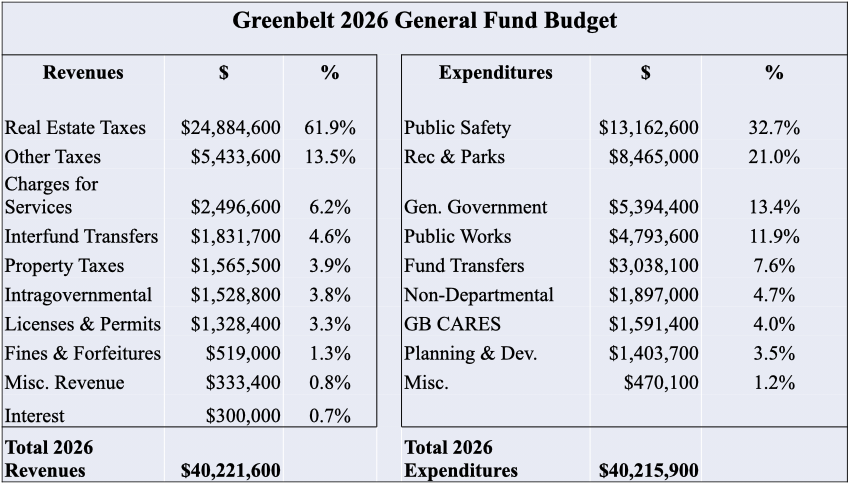The proposed eviction freeze died in a 3-3 tie at the November 23 regular meeting of the Greenbelt City Council. Legislation banning rent rate increases and late fees passed. Earlier that day Governor Lawrence Hogan had announced $19 million in Maryland Eviction Prevention Partnership grants, $2,672,725 of which are designated for Prince George’s County. It was not yet known whether or how much of this money would be available to Greenbelters.
Eviction Freeze
The ordinance would have declared a freeze on evictions for failure to pay rent effective immediately through December 31, 2021, or 60 days after the end of the county state of emergency. It provided that council may review requests for waivers of this ordinance and that landlords who violate this ordinance shall be subject to “a separate municipal violation of Five Hundred ($500.00) Dollars for each day for each separate violation.” The ordinance would have applied to all landlords regardless of the number of units they rent.
Mayor Colin Byrd, Councilmembers Rodney Roberts and Judith Davis voted for the ordinance, Councilmembers Silke Pope, Edward Putens and Leta Mach voted no and Councilmember Emmett Jordan abstained. Jordan said he was abstaining because the law is unenforceable and he is concerned about the city’s “out of control legal expenses.” When questioned why he did not just vote no, Jordan replied that he did not want to “stand in the way.”
The vote was preceded by a lengthy and wide-ranging discussion of the eviction freeze. The issues raised included:
Is It Premature?
Mach consistently voted no on all amendments and the ordinance itself, along with the rent freeze ordinance, stating that it was premature and that council needed to meet in a worksession to flesh out the details of how the freezes would work. Pope also called for a worksession on the issue.
Although Davis voted for all three ordinances, she said “this is the most backward way of doing an ordinance” bemoaning the fact that council had not worked with staff to work out all the “nitty gritty points” around the freezes.
Authority
City Solicitor Todd Pounds assured council that the city has the authority to control the activities of landlords within its boundaries. Since the city is not involved in the eviction process, or even informed of requests to evict a tenant, they would have to rely upon tenants reporting that they had received an eviction notice. The city does not have the authority to stop an eviction nor put evicted tenants back into their units. Instead, the city would have to issue a municipal infraction to fine the landlord, which Pounds would then prosecute.
Penalties
Pounds told council that the courts were unlikely to impose the daily fines the three freeze ordinances would impose. However, council did not discuss the proposed penalties and did not change the penalty language in any of the three ordinances.
Enforcement
Director of Planning and Community Development Terri Hruby urged council to consider the staff time and resources to enforce an ordinance if it is not going to prevail in court. She pointed out that the city has never been involved in landlord-tenant issues. Jordan and Putens called the ordinance unenforceable while Roberts disagreed.
Impact on Landlords
Putens, Pope and Jordan raised concerns about landlords who may have had to move out and rent their unit when they lost their job or had to move. Pope pointed out that landlords are required to maintain their units and pay the mortgage and other fees due. Without receiving rent, how would they do that? Currently, tenants can get rental assistance that provides landlords with income. However, that aid is expiring.
Roberts doubted that many evictions were affecting small landlords while Jordan said there has been a large increase in foreclosures related to evictions in condominiums.
Pope suggested that the city partner with property owners to see how to help people stay in their homes and not chase landlords out of town or into financial ruin.
Scope of Freeze
Pope wanted to limit the ban to evictions due to Covid-19. However, Davis and Byrd opposed such a limit. Davis asked how the city could prevent people who could afford to pay their rent from taking advantage of the freeze to not do so. Pounds admitted that is a “tremendous problem” but he had no idea how the city could prevent that from happening. Roberts felt that a tenant would have to testify to establish why they could not pay, which he called a built-in mechanism.
Greenbelt Homes Inc. (GHI) President Stefan Brodd raised another issue, pointing out that county law defines housing cooperatives as rental facilities. He requested that evictions for failure to pay co-op fees be permitted. He noted that GHI fully expects its subsidiary Greenbelt Development Corporation which does rent apartments, would have been covered by the freeze. If it passed, in addition, members who sublet their units, and who are required to get city rental licenses, would also be covered, according to Davis.
Davis suggested using the waiver provision of the ordinance but it is unclear how that process would work. Council discussed GHI’s situation further under the rent freeze ordinance.
Rent Freeze
A second ordinance would prohibit landlords from raising rents effective from the date of passage through December 31, 2021, or 60 days after the end of the county state of emergency. At the request of Davis, the freeze only exempts landlords with one unit, not 10 as provided in the original ordinance.
GHI’s Brodd told council that if this ordinance applied to its fees, GHI is projecting a shortfall of up to $400,000, which it has no margin to pay. He told council that GHI has done a lot to help members who cannot pay their fees but asked how GHI was to come up with an additional $400,000 if it cannot raise its fees on members. While Roberts felt certain that the ordinance would not affect GHI as members do not pay rent, Byrd did not think that the solution was to allow GHI to increase its fees by the planned 2.6 percent.
Davis worried that if the ordinance applied to GHI, council was going to have to consider condominium fees, as well.
The rent freeze passed on a 4-3 vote with Mach, Pope and Putens opposed.
Late Fees
The final ordinance, prohibiting landlords with more than one rental unit from imposing late fees, passed on a 5-2 vote with Pope and Putens opposed.
On a motion from Davis, council added a requirement that each landlord will offer a repayment plan to make back payments with two years to repay past rent. Pounds cautioned that this provision could create a big problem. In real life, suits for repayment are difficult and expensive and landlords instead send past due accounts to a collection agency within 90 to 180 days.



